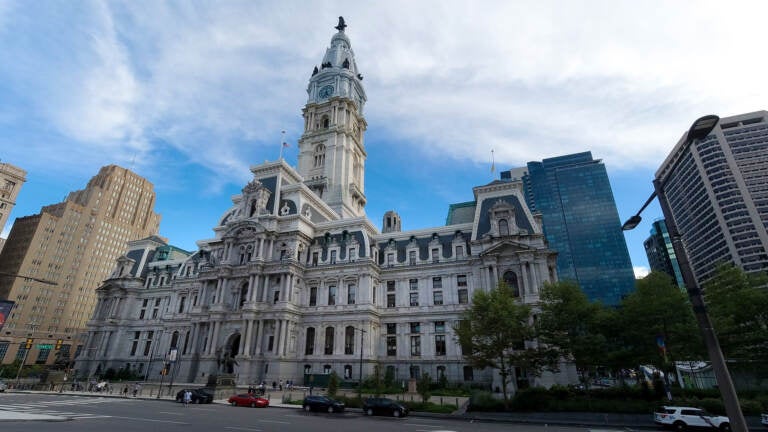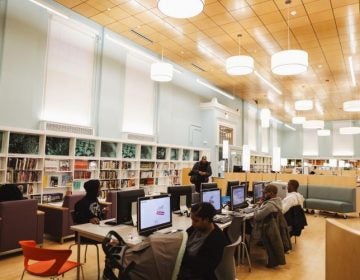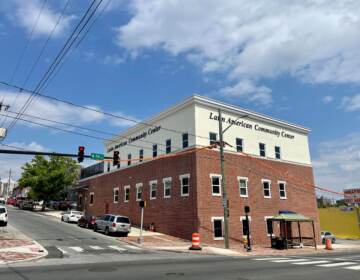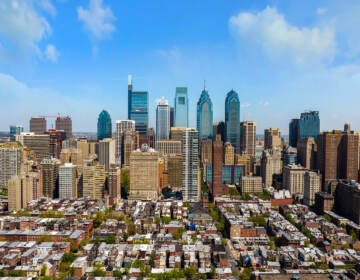To get unconnected neighbors online, Philly needs to ramp up offline efforts
The White House’s broadband affordability plan is a big opportunity for Philly — but getting families signed up demands offline efforts, writes Julia Rivera.

Philadelphia City Hall (Mark Henninger/Imagic Digital)
A few months ago, President Joe Biden made a historic announcement in a Rose Garden press conference: For the first time in history, every low-income American can now get high-speed internet service for free.
Amidst a pandemic that exposed the costs of digital inequality, Biden’s Affordable Connectivity Program (ACP) — with an assist from broadband providers lowering their prices — eliminates monthly internet bills as a driver of our digital divide.
Yet, I suspect relatively few among the announcement’s most important audience — the 16% of Philadelphians who still don’t have a home internet connection — are even aware it happened. Less than three in ten households eligible for the ACP have signed up for the program since it launched on December 31, 2021.
Without an aggressive game plan for getting families equipped, enrolled, and empowered to thrive online, Biden’s triumphant Rose Garden moment risks becoming a premature celebration of a missed opportunity.
The Wall Street Journal recently chronicled the challenges officials face trying to raise awareness of this new benefit program in small-town rural Louisiana. Here in Philadelphia, our first hand experience with the PHLConnectED initiative, part of the City of Philadelphia’s Digital Equity Plan, suggests we have an equally steep hill to climb.
PHLConnectED launched two years ago as a groundbreaking public-private collaboration, offering free broadband service to low-income families with school-aged children. But a full year after the program’s launch, a report from 2021 shows that only 9% of K-12 households were even aware it existed.
To be clear, the program has been an important success: PHLConnectED has helped 21,000 additional K-12 households across the city gain in-home connectivity, and has been extended through this new school year. But this process taught us how hard it is to get the word out to neighbors largely cut off from the news sites and social media services most of us take for granted.
Meanwhile, the 9% of K-12 households across Philly still not connected to high-speed internet at home are a clear reminder that even offering free internet service — in a city where it’s near-universally available — is no guarantee everyone will sign up. Boosting ACP participation is more than just a marketing challenge. To reach full participation, we’ll have to tackle the offline factors underpinning online inequality.
For example, one-third of U.S. adults don’t have basic computer skills needed to feel comfortable navigating online. Thousands of families across Philly are facing eviction, living in temporary housing, or sharing an illegally divided multi-family home; signing up for home internet service may not be top of mind for many.
For non-English speakers, language barriers may make it more difficult to sign up for digital training classes or the federal ACP benefit. Mistrust of the government is a big obstacle, too, particularly in immigrant communities where an eligible resident may worry that enrolling could put an undocumented family member or neighbor at risk.
These aren’t challenges that can be solved from 30,000 feet. We can only overcome them at the ground level, working through an infrastructure of local advocates and allies who have the credibility and close relationships to reach and reassure skeptical neighbors.
Luckily, we’re not starting from scratch: PHLConnectED has started assembling a constellation of community groups to offer digital skills classes — including Congreso de Latinos Unidos, a nonprofit working to economically empower individuals and families in predominantly Latino neighborhoods. Only 65% of Hispanic adults nationwide have broadband at home, compared to 80% of white adults.
In Congreso’s work in the community — 78% of our clients identify as Latino — broadband connectivity and digital literacy are now lifelines to reach and engage community members with essential services like education, workforce development, housing, health, and family services.
We’ve seen firsthand how empowering unconnected neighbors to finally get online can change lives: Tuning into a virtual parenting class from home; joining an online job training program to earn a livable wage; consulting with a healthcare provider via telehealth; or enjoying a live-streamed cultural or educational event.
Encouragingly, our school district has a two-year head start helping K-12 parents in lower-income households learn about — and sign up for — broadband assistance programs. And social services agencies already working daily with eligible lower-income Philadelphians should quickly become a conduit for awareness and assistance.
But fully capitalizing on the new guarantee of universal broadband affordability demands we dramatically scale up these efforts, including ramping up the city’s Digital Navigators program. 65% of participants in similar Navigator programs nationwide found these programs helped them gain internet access or a computer at home.
There’s an unprecedented geyser of federal money available for this critical work, from the American Rescue Plan to the infrastructure bill’s Digital Equity Act. Let’s put it to good use.
President Biden’s broadband affordability push is a historic opportunity for Philadelphia. But we still have a lot of work left to do if we hope to seize it.
Julia Rivera is the Chief External Affairs Officer at Congreso de Latinos Unidos, a nonprofit organization serving Philadelphia’s Latino neighborhoods.

Saturdays just got more interesting.
WHYY is your source for fact-based, in-depth journalism and information. As a nonprofit organization, we rely on financial support from readers like you. Please give today.








